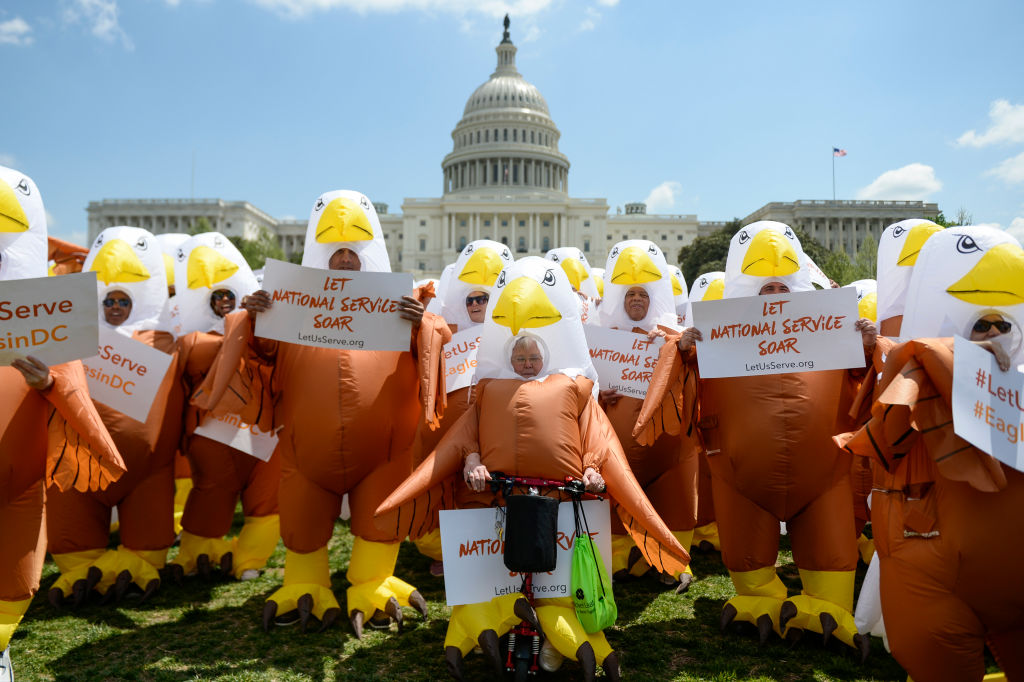
Thirty years ago, President Bill Clinton signed the National and Community Trust Act of 1993, creating a new federal agency to mobilize young people in service to the homeland through public-private partnerships. It's grown in every presidential administration since, both Republican and Democratic, with its inaugural class of 20,000 service members swelling to more than 1.25 million.
But now Congress is considering halving the program, eliminating tens of thousands of national service member opportunities.
These deep cuts defy common sense, public opinion, and wise investing. Congress has a responsibility to be faithful stewards of our tax dollars. But that's precisely why it must continue supporting AmeriCorps: every dollar it invests in national service yields a $17 return on investment to the country, according to a 2020 analysis. Its impact is reflected in the public’s widespread support. A With Honor Action national survey found a supermajority of Americans, nearly 90 percent, support voluntary national service. A majority in the same poll also said that a more robust national service program would help bridge our country's political divisions.
The early days of AmeriCorps were an experiment, a proof-of-concept that national service could solve community problems and transform young people into active citizens. It's not an experiment anymore; we know national service works and works well. And the challenges at which AmeriCorps has proven most adept are the same ones facing our nation today: pandemic-era remote learning that set back our kids' education, the struggle of working families to put food on the table amidst inflation, and natural disasters that batter our communities.
Opposition to national service is largely rooted in a misunderstanding of the program's design, operation, and oversight. National service doesn't happen in federal government buildings. As a vehicle to address community-level challenges, AmeriCorps's decisions and budget are principally managed by governors and its services are delivered by community, nonprofit, and faith-based organizations. When you find AmeriCorps members in national and state parks, in the aftermath of storms and fires, and at the whiteboards in our schools, it's because states and communities wanted them there.
Haley Barbour, the former Republican governor of Mississippi, said AmeriCorps members did the "back- and heart-breaking work of dredging the Gulf Coast" in the days and weeks following Hurricane Katrina. AmeriCorps "helped save Mississippi," he said. Those who've watched AmeriCorps know some of its greatest triumphs were born in America's most profound tragedies — from Katrina to the devastating fire in the Lahaina community on Maui, when hundreds of AmeriCorps members stepped up to aid the injured, serve as caseworkers for families searching for loved ones, and to help those affected and displaced by the disaster to access housing and healthcare.
President Clinton—and leaders in both parties over the last 30 years—have invested in AmeriCorps, and have fought to grow and strengthen it because they believe in the idea that Americans will do the hard, necessary things to improve our communities if given the chance. AmeriCorps has touched tens of millions of lives in every state. But the legacy of national service shouldn't be measured in the million-plus members who've served; it's in the students whose lives AmeriCorps members changed for the better, the churches whose food pantries have been stocked and staffed, and the nonprofits who were able to serve more of our veterans and seniors.
The spirit of service that fuels AmeriCorps has united Americans of every color, class, faith, and political party for 30 years. Congress should build on that legacy, not diminish it. America deserves nothing less.
More Must-Reads from TIME
- Donald Trump Is TIME's 2024 Person of the Year
- Why We Chose Trump as Person of the Year
- Is Intermittent Fasting Good or Bad for You?
- The 100 Must-Read Books of 2024
- The 20 Best Christmas TV Episodes
- Column: If Optimism Feels Ridiculous Now, Try Hope
- The Future of Climate Action Is Trade Policy
- Merle Bombardieri Is Helping People Make the Baby Decision
Contact us at letters@time.com